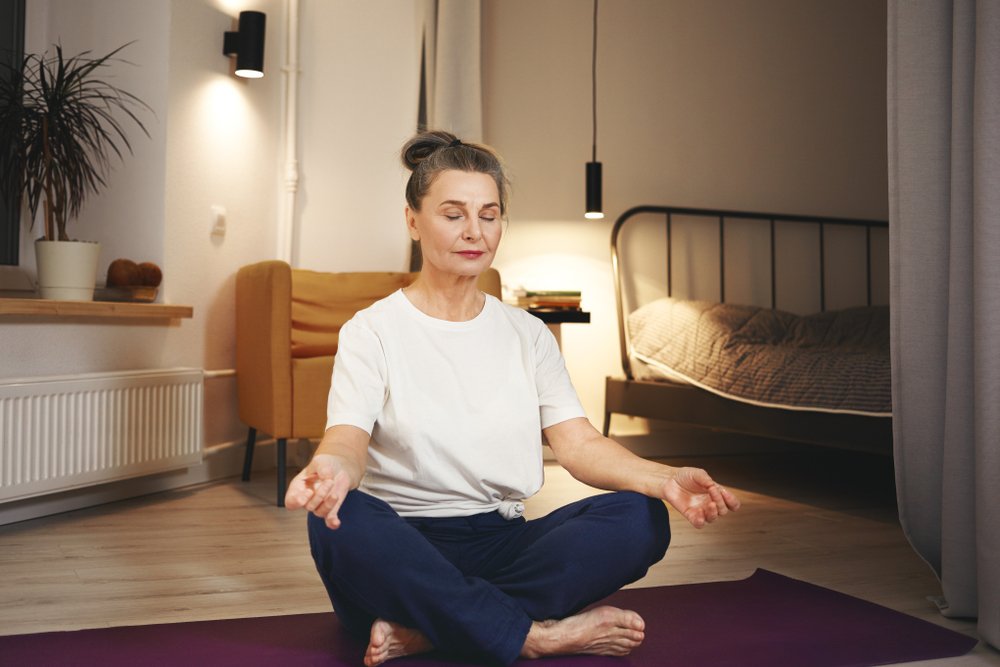Quality sleep is an essential component of good mental and physical health, yet many of us struggle to find it. Ann Vrlak explores how deep sleep meditation could increase your chances of improved rest and well-being.
Some years ago, I told a doctor friend: “I’m having so much trouble sleeping. What’s wrong with me? Who can’t fall asleep, for heaven’s sake!?” She laughed and said, “Well, only most of the planet!” It turned out she was right. The American Sleep Association says that 50-70 million adults in the US have a sleep disorder. Insomnia is the most common in the short term (30 per cent of Americans), but it also affects 10 per cent in the long-term.
In my journey to more thoroughly understand sleep and enjoy better sleep, I have read a lot about how common sleep problems are, how they affect us, and what we can do to improve the quantity and quality of our sleep. As a meditation teacher, I was sure that meditation could play a big role. So, this article is about the benefits of deep sleep meditation and how these practices can help you drift off more quickly and enjoy more restorative sleep.
Why deep sleep is crucial
My doctor friend told me that Ariana Huffington – the über-successful founder of Huffington Post – left the company in 2016 to form a wellness website focused on sleep.
Huffington began this journey when she collapsed one day from exhaustion. She had always been an energetic and healthy person, but sleep was not something she made a priority. Her health crisis motivated her to delve into the importance of sleep and what she calls the “sleep deprivation crisis” of our modern world.

Deep sleep meditations encourage quality rest
Today, a year into the COVID-19 pandemic, studies are showing sleep problems are becoming even more common – yet another effect of the isolation, loneliness and disruption so many of us are experiencing.
If you don’t sleep well once in a while, your body will adapt. However, if you’re someone who regularly has trouble getting to sleep or staying asleep and wake up feeling exhausted, I hope this article will convince you of the importance of aqequate shut-eye and convince you to give deep sleep meditations a try.
“Deep sleep meditations are a way to encourage your mind, body and spirit to do what it naturally wants to do: rest, heal and rejuvenate.”
And, in case you think a chronic lack of quality sleep isn’t a priority in your life, don’t be fooled. Some of the damaging effects include:
- Impaired judgement
- Slowed reaction time
- Weight gain
- Hypertension
- Conflicts with others
- Mental fog and poor concentration
- Impaired immune system
- Anxiety and depression
Benefits of deep sleep meditation
I hope the list above gives you an idea of just how crucial healthy sleep is to you. Sleep is regulated by neurochemicals in the brain which, in turn, regulate a whole range of mental and physical processes. So, when poor sleep is ongoing, just about everything you think, feel and do can be negatively affected.
As you might expect then, the benefits of regular, healthy sleep are just as profound in the positive direction! You can expect to:
- Feel mentally alert
- Be able to concentrate and problem-solve
- Have a high-functioning immune system
- Better communication and connection with others
- Be better able to maintain your weight
- Reduce hypertension, as well as anxiety and depression
In a nutshell, regular quality sleep will keep your brain in a powerful, balanced cycle of health that will support you in a whole host of ways.
How much sleep do I need?
Most adults need between seven to eight hours sleep a night. And, it’s important to sleep close to this amount every night. Three hours one night and 10 hours the next throws your brain chemistry and your circadian rhythm out of balance. When it comes to sleep, routine is king.
Deep sleep meditations you can try
There are many guided meditations you can try, online or in many of the meditation apps. Whichever you choose, please keep this in mind: sleep is a natural process. It’s not something you should need to force. Deep sleep meditations are just a way to encourage your mind, body and spirit to do what it naturally wants to do: rest, heal and rejuvenate. Every night.
MORE LIKE THIS:
- How to Meditate in Bed for Beginners
- Restorative Yoga: Poses That Invite Deep Relaxation In
- How to Do Yoga Nidra For Sleep: 4 Steps and Script
Here are a couple of deep sleep meditation videos I recommend. If poor sleep is troubling you, I hope you’ll give them a try.
1. Guided meditation with Tara Brach | 15 minutes
This is a lovely breath and body scan deep sleep meditation. At just 15 minutes, it's a great one to practise just prior to heading to bed.
2. Jason Stephenson | 1 hour
This guided meditation is an example of another type of deep sleep meditation: a visualization journey. Stephenson’s “Floating Among the Stars” meditation begins with a relaxation session then takes you through a visualization experience.
The power of deep sleep meditations
Meditation is uniquely suited as a before-sleep routine, especially deep sleep meditations that help you release stressful thoughts (the biggest cause of insomnia for many of us). Breath and body scan meditations are the oldest and most effective deep sleep meditations.
RELATED: Yes, You Can Meditate Lying Down. Here's How and Why
Here are just a few reasons why these meditations will be a helpful tool if you have sleep issues. Again, they will help you to focus on your body and physical sensations, instead of your thoughts. You might have noticed that your troubling thoughts all seem to come out when you get into bed! Not only that, but if you’re like me, you might try to think yourself into sleep; you can probably guess how well that works.
 Meditation enables your pre-sleep brain shutterstock/shurkin_so
Meditation enables your pre-sleep brain shutterstock/shurkin_so
I can’t overstate how much your sleep will improve if you embrace deep sleep meditations that gently direct your attention away from your thoughts. If you try to STOP your thoughts, this is a direct path to frustration. But if you give your attention something else to focus on, you’ll start to feel your mind relax.
Saying that, it’s really important not to expect your mind to go willingly at first. Thinking, planning and worrying as we settle down for the night are all ingrained habits for most of us. So, please be patient as you try any of these deep sleep meditation.
MORE LIKE THIS:
- Cat Naps – 5 Health Benefits of Taking a Siesta
- Feel Stress-Free Fast: 11 Science-Backed Techniques
- 14 Sleep Hacks to Get a Good Night's Rest
As you focus less on your thoughts and more on your body, you will set in motion the relaxation response in your brain. Paying attention to your breath and bodily sensations tell your brain that you’re “safe.” Your parasympathetic nervous system, that governs all kinds of wonderful healing processes, sends relaxation chemicals throughout your body. This supports not only your sleep, but your ability to relax and open further to deep sleep meditation.
“Meditation is uniquely suited as a before-sleep routine, especially deep sleep meditations that help you release stressful thoughts.”
Another strength of deep sleep meditations that focus on breath and body is that they bring you into the present moment. You need to be present to feel the subtle sensations of warmth or coolness as you breathe, or the tension in your shoulders or stomach.
This kind of sustained, kind, precise attention to what you’re experiencing right now gathers your attention from the many places it may be wandering, to one gentle, aware place within yourself. Try it. You may be surprised how calming paying attention to one thing can be!
These meditations for deeper sleep also help you to become quieter, to notice the silence within your breath and within your body. These quiet spaces are small doorways that say, “This way! I’ll take you to the quiet, rest and release of sleep.”
Most meditation traditions see great value in reaching deeper sleep, rather than the superficial level of sleep which is also all too common. They provide an opportunity to sink into the thought-less realm of your being, every day, and bathe in pure awareness. Because most of us spend much of our days doing, planning and being busy, this deeply restful time is seen as an essential oasis of healing and rejuvenation for mind, body and spirit.
Conclusions: deep sleep meditation
Quality sleep is an integral part of good mental and physical health. Sadly, many of us struggle to get adequate rest due to stress, worry, anxiety and overthinking. However, we can use deep sleep meditation techniques to encourage our body to enter a state of relaxation and rest. Try watching the videos suggested and following the above tips to help you on your way to a good night's rest. Sweet dreams. •
Main image: shutterstock/Billion Images
happiness.com | The fine art of being: learn, practise, share
Are you a happiness.com member yet? Sign up for free now to enjoy:
■ our happiness magazine with practical life tips
■ share and support in our happiness forum
■ self-develop with free online classes in our Academy
Written by Ann Vrlak
 Ann Vrlak is Founder of OneSelf Meditation and a meditation practitioner for over 25 years. She’s a Certified Meditation Teacher for adults and for children (the best job ever!). She loves to share how the perspective and practice of meditation can support people with their everyday stresses and on their journey of self-discovery.
Ann Vrlak is Founder of OneSelf Meditation and a meditation practitioner for over 25 years. She’s a Certified Meditation Teacher for adults and for children (the best job ever!). She loves to share how the perspective and practice of meditation can support people with their everyday stresses and on their journey of self-discovery.



Join the conversation
You are posting as a guest. If you have an account, sign in now to post with your account.